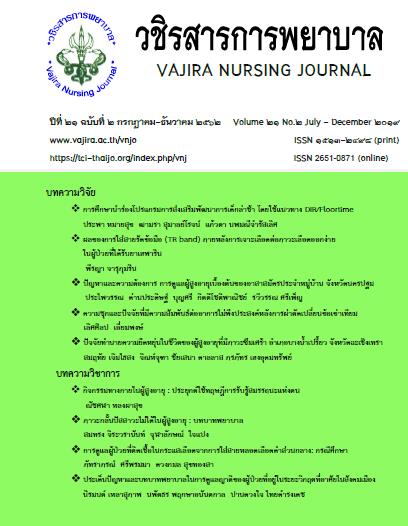Issues and Nurses’ Role in the Care for Relatives of Critically Ill Patients in The Urban Society
Main Article Content
Abstract
Critical illness is a threat to the life of the patients. Illness crisis directly effects on not only the patient’s life, but also the critical illness patients’ relatives. Living in the urban society, especially a city has a heavy traffic problem produces a problems to the family members, such as not able to visit the hospital on time. This contributes to the less cares from their relatives, inadequate receiving the information from healthcare providers, and lack of social supports. The relatives of critically ill patients may experience stress from this situation. Therefore, nurse must understand the characteristics of this urban community and promote the family members’ critically ill patients to more participate in the care. For example, it can add more an extension of visiting time, the information via the telephone, and collaboration between multidisciplinary care team in order to support the relatives of critically ill patients living in the urban community can confront and overcome crisis situations.
Article Details
เนื้อหาและข้อมูลในบทความที่ลงตีพิมพ์ในวชิรสารการพยาบาลถือเป็นข้อคิดเห็นและความรับผิดชอบของผู้เขียนบทความโดยตรง ซึ่งกองบรรณาธิการไม่จำเป็นต้องเห็นด้วย หรือร่วมรับผิดชอบใด ๆ ทั้งสิ้น
บทความ ข้อมูล เนื้อหา รูปภาพ ฯลฯ ที่ได้รับการตีพิมพ์ในวชิรสารการพยาบาล ถือเป็นลิขสิทธิ์ของวชิรสารการพยาบาล หากบุคคลใดหรือหน่วยงานใดต้องการนำทั้งหมดหรือส่วนหนึ่งส่วนใดไปเผยแพร่ต่อหรือเพื่อกระทำการใด ๆ จะต้องได้รับอนุญาตเป็นลายลักอักษรจากวชิรสารการพยาบาลก่อนเท่านั้น
References
จุรานุช จอมโคกสูง ชนัดดา แนบเกษร และจิณห์จุฑา ชัยเสนา ดาลลาส. (2561). ผลของจิตบำบัดแบบประคับประคองรายบุคคลต่อความเครียดของสมาชิกครอบครัวผู้ป่วยวิกฤตที่เข้ารับการรักษาในหอผู้ป่วยวิกฤตศัลยกรรม. วารสารพยาบาลทหารบก, 19(ฉบับพิเศษ), 305-315.
ทวีศักดิ์ สิริรัตน์เรขา. (2561). ผลวิจัยเผยคนกรุงเครียดกว่าคนต่างจังหวัด 2 เท่า. สืบค้นจาก BLT Bangkok https://www.bltbangkok.com
นิรมนต์ เหลาสุภาพ. (2556). ผลของโปรแกรมการจัดการความเครียดสำหรับญาติผู้ป่วยวิกฤตต่อ ความเครียดของญาติ. วิทยานิพนธ์ปริญญาพยาบาลศาสตรมหาบัณฑิต, มหาวิทยาลัยมหิดล.
วิจิตรา กุสุมภ์. (2560). การพยาบาลผู้ป่วยภาวะวิกฤต: แบบองค์รวม (พิมพ์ครั้งที่ 6). กรุงเทพฯ: สหประชาพานิชย์.
วรวุฒิ ขาวทอง อัจฉรา สุคนธสรรพ์ และสุภารัตน์ วังศรีคูณ. (2562). ประสิทธิผลของการดูแลผู้ป่วยวิกฤตเฉียบพลันตามแนวคิดครอบครัวเป็นศูนย์กลางของการดูแลในหน่วยงานอุบัติเหตุฉุกเฉิน. พยาบาลสาร, 46(2), 176-187.
ศรญา ยังเจริญ และวาสินี วิเศษฤทธิ์. (2558). ผลของการใช้รูปแบบพยาบาลเจ้าของไข้ต่อคุณภาพการดูแลตามการรับรู้ของญาติผู้ป่วยวิกฤตและความพึงพอใจของพยาบาลวิชาชีพ. วารสารพยาบาลโรคหัวใจและทรวงอก, 26(2), 53-67.
แสงอรุณ ใจวงศ์ผาบ ประทุม สร้อยวงค์ สุดารัตน์ สิทธิสมบัติ และมยุรี สำราญญาติ. (2560). สุขภาวะทาง จิตวิญญาณของญาติผู้ป่วยวิกฤต. พยาบาลสาร, 44(4), 36-48.
โสมรัศมิ์ จันทรัตน์ กฤษฎ์เลิศ สัมพันธารักษ์ อัจจนา ลํ่าซํา และภูมิใจ ตั้งสวัสดิรัตน์. (2562). มองวิถีเมืองและชนบทกับบทบาทหญิงชายต่อหนี้ครัวเรือนไทยผ่าน Big Data ของเครดิตบูโร. สถาบันวิจัยเศรษฐกิจป๋วยอึ๊งภากรณ์. สืบค้นจาก https://www.pier.or.th
อิสรีย์ ศรีศุภโอฬาร และนรลักษณ์ เอื้อกิจ. (2559). ผลของโปรแกรมการตอบสนองความต้องการของครอบครัวผู้ป่วยวิกฤตต่อความวิตกกังวลของสมาชิกครอบครัวผู้ป่วยวิกฤต. วารสารพยาบาลสงขลานครินทร์, 36(3), 71-93.
ฮากีม ผูหาดา. (2557). วิถีชีวิตคนเมืองในประเทศไทย: แนวโน้มใหม่. แผนงานนโยบายสาธารณสุขเพื่อการพัฒนาอนาคตของเมือง ศูนย์ศึกษามหานครและเมือง มหาวิทยาลัยรังสิต. สืบค้นจาก https://www.slideshare.net/FURD_RSU/the-new-trend
Aguilera, D. C. (1998). Crisis intervention: Theory and methodology (8th ed). California: St. Louis: C. v. Mosby.
Kanmani, T. R., Thimmappur, R. M., Birudu, R., Reddy, K. N., & Raj, P. (2019). Burden and Psychological Distress of Intensive Care Unit Cargivers of Traumatic Brain injury Patients. Indian Journal of Critical Care Medicine. 23(5), 220-223.
Lazarus, R., & Folkman, S. (1984). Stress, appraisal, and coping. New York: Springer Publishing. Ministry of Health Services British Columbia. (2001). Peer support manual. British Columbia: Columbia.
Swanson, K. M. (1991). Empirical development of a middle rang theory of caring. Nursing Research, 40(3), 161-167.
Wintermann, G., Petrowski, K., Weidner, K., Straub, B., & Rosendahl, J. (2019). Impact of post-traumatic stress symptoms on the health-related quality of life in a cohort study with chronically critically ill patients and their partners: age matters. BioMed Central Journals, 23(39),1-10.

